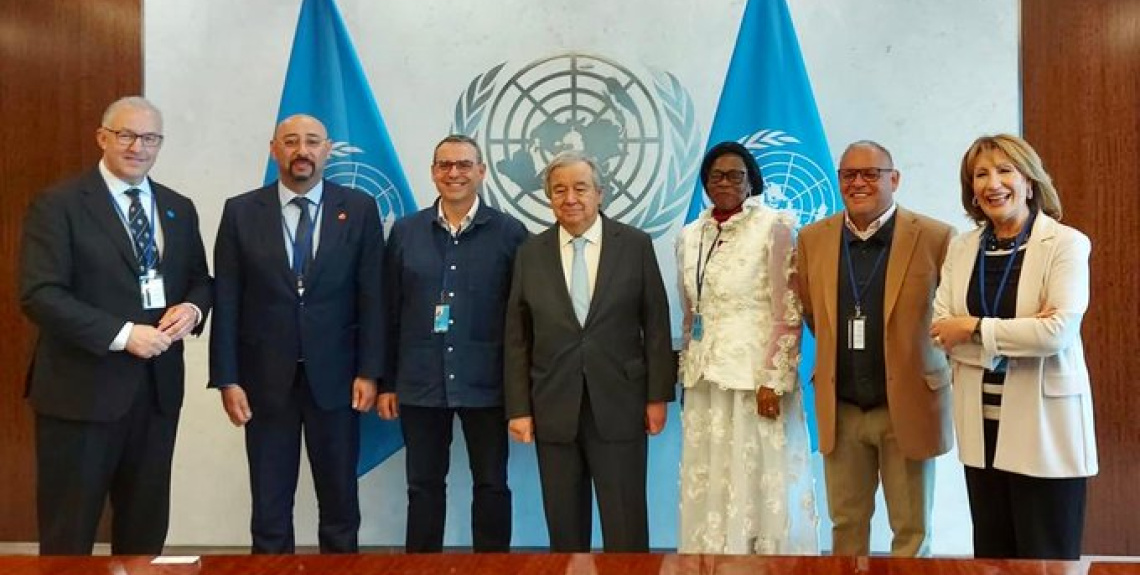New York, United States, 24 March 2023 - The UN-Water 2023 Conference brought together 10,000 participants at its New York headquarters to urgently scale up action to address the water crisis at all levels of government. UCLG facilitated a delegation of over 35 local and regional governments to advocate for their role in ensuring access to water for all people. Forty-six years after the first and last edition of the conference in Mar del Plata, access to water still needs to be a fulfilled universal human right.
In 1977, national representatives attended the UN conference in Mar del Plata. Today, in a more democratic context, local leaders collectively participate at the international tables to ensure access to water for all people.
Rodrigo Mundaca, Governor of the Valparaiso Region (Chile), and Philippe Rio, Mayor of Grigny (France), represented the Committee on Social Inclusion, Participatory Democracy and Human Rights (CISDPDH) at the Water 2023 Conference. Both local representatives shared the experiences of their territories and the challenges that local and regional governments still face in making water a common good with local, public, and sustainable management in all localities and regions of the world.
From Chile to France, water management is still under a global model of commoditization and privatization. Today, one person in three cannot access safe drinking water (UN). Not only are people deprived of this vital resource for their daily survival, but they are also excluded from participatory processes to decide on its management and use.
For example, in Chile, only those with a water use title, whether subway or surface, can participate in the administration of water bodies. Meanwhile, in France, private companies dominate the economic benefits of commoditizing a good that should be public.
The control of private companies over water is such that the power of these groups was also present and was represented at the Conference in New York. There were even verbal and symbolic confrontations between private firms and civil society, whose voice also needs a space in global water management.
In the face of private power and together with civil society, the fundamental role of local and regional governments in global water management also stands up.
"In front of the regional government of Valparaiso, we have raised a water policy that emphasizes fundamentally on the security and increase of the water source." - Rodrigo Mundaca, Governor of the Valparaíso Region (Chile).
This is how Governor Mundaca described the efforts undertaken in his region to finance community rural drinking water systems, which represent the only community ownership of this asset. At the same time, the Regional Government of Valparaíso is also financing the sanitation of the sewerage system, since many people in the region still live without access to sanitation and drinking water. As such, this regional government is advancing a model of water governance with a focus on security and sustainability, where not only the owners participate, but also the communities take part in the administration tables in the region.
To continue the conversation, Philippe Rio, mayor of Grigny, tells us in his own voice about his experience at the UN Water Conference 2023, while calling for the recovery and localization of public control of water management.
Let's turn the page on water profits by local public control, by Philippe Rio, mayor of Grigny
During this United Nations conference, as water activists, we carried the message loud and clear that it was time to turn the page on profits on this common good essential to life.
To do this, local authorities have a major role to play in the public reappropriation of water. By controlling its production tools as well as its sustainable management, the local public water service makes it possible to preserve natural resources and to make water accessible to all.
During the conference, the multinationals often ape the words and ecological indignation of representatives of civil society, NGOs and local elected officials to better muddy the waters and achieve their goals. On the sidelines of the General Assembly, in the meeting rooms, a confrontation was rumbling from which could result a part of the ecological future of our planet, as the water war is the consequence of a predatory capitalism of the natural resources of the world, to the detriment of access to all of them.
46 years after the summit of Mar del Plata, we can congratulate ourselves that this conference has put water at the heart of the world agenda by the appointment of a special rapporteur. But everything will depend on the capacity of governments and peoples to unite and affirm that water is a common good of humanity. And you can all take action by signing the Water Justice Manifesto petition.


